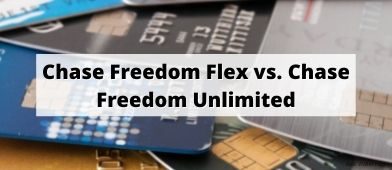With the world reopening, travel credit cards are making a comeback and two of the best cards on the market come from Chase – the Chase Sapphire Preferred and Chase Sapphire Reserve.
While they’re both from Chase, they’re designed for slightly different travelers.
Both offer a great rewards earning schedule. Both have annual fees. Both cards earn Chase Travel℠ on purchases, which if you’re new to “maximizing travel rewards,” Chase Travel℠ reward points are the most valuable points for booking award travel in many instances.
If you’re deciding between the two, this post will help you pick the best card for your needs.
Table of Contents
- At a Glance
- Signup Bonus
- Annual Fee
- Credit Score Needed for Chase Sapphire
- Earning Chase Travel℠ Rewards
- Redeeming Chase Travel℠ Rewards
- Travel Protection Benefits
- Trip Cancellation and Interruption
- Trip Delay Reimbursement
- Emergency Medical and Evacuation
- Auto Rental Collision Damage Waiver
- Additional Card Benefits
- Sapphire Reserve Card Benefits
- Chase Sapphire Preferred Card Benefits
- Chase Sapphire Preferred Partner Benefits
- Chase Sapphire Preferred vs. Chase Sapphire Reserve: Who Wins?
- Summary
At a Glance
Depending on your travel and spending habits, in addition to your current credit card portfolio. You may already have a clear winner for your situation.
If you’re short on time, here’s the skinny on both cards. We go into greater detail below.
| Chase Sapphire Preferred Card | Chase Sapphire Reserve | |
|---|---|---|
| Sign up Bonus | 60,000 Ultimate Rewards points after you spend $4,000 in purchases within the first three months | 60,000 Ultimate Rewards points after you spend $4,000 in purchases within the first three months |
| Rewards rates | 5x points on travel purchased through Chase Ultimate Rewards, 3x points on dining, select streaming services and online groceries, 2x on all other travel purchases, 1x on everything else (plus a $50 annual Ultimate Rewards Hotel Credit) | 5x points on air travel and 10x on hotels and car rentals purchased through Chase Travel℠, 3x points on other travel, 1x on everything else |
| Annual fee | $95 | $550 |
| Credit Required | Good to excellent | Good to excellent |
| Learn more about this card | Learn more about this card |
Signup Bonus
Both cards offer attractive signup bonuses that can quickly pay for your next vacation.
The eligibility for either bonus is the same:
- You cannot currently own a Chase Sapphire card
- Must not have received another Sapphire signup bonus in the last 48 months
If you’re a first-time applicant for either Sapphire product, you’ll most likely qualify for this bonus. Returning cardholders can earn a second bonus if their first bonus was awarded at least 48 months ago — that’s four years ago.
If you currently have a Sapphire card, you will need to contact Chase and ask to convert your account to the other product and won’t qualify for the signup bonus.
Sapphire Preferred Signup Bonus (~$1,050 Value)
The Chase Sapphire Preferred currently has the more valuable offer and both have the same minimum spend requirement.
You receive an 60,000 Ultimate Rewards points after you spend $4,000 in purchases within the first three months. It’s worth a bundle in award travel as each point is worth 25% more when booking award travel.
Sapphire Reserve Signup Bonus (~$900 Value)
The Chase Sapphire Reserve is currently offering 60,000 Ultimate Rewards points after you spend $4,000 in purchases within the first three months. This bonus is worth as much as $900 for award travel bookings using the Chase Travel℠ travel portal as each point is worth 50% more than the redemption value for cash and gift cards.
Annual Fee
One of the most important factors to consider is the annual fee:
- Chase Sapphire Preferred Card: $95 for the primary card and $0 for additional cards
- Chase Sapphire Reserve Card: $550 for the primary card and $75 per authorized user
The Sapphire Reserve’s $550 annual fee may be eye-popping at first glance as it’s a premium travel credit card. You pay more upfront but get several additional benefits and a more robust rewards program that can provide more value and help you save money.
For example, cardholders get an annual $300 statement credit to cover travel expenses.
Frequent flyers are the best candidates for the Sapphire Reserve. If you only take a handful of trips each year, the Sapphire Preferred can be better.
Credit Score Needed for Chase Sapphire
Both Sapphire cards require a good or excellent credit score. Your approval odds can be best if your score is above 700.
Other factors include your annual income, monthly expenses and recent credit inquiries. These factors also influence the initial card spending limit.
The Sapphire Preferred is a Visa Signature product with a minimum $5,000 spending limit. The Sapphire Reserve has a minimum $10,000 limit as it’s a Visa Infinite product.
You can try prequalifying for Chase credit card offers to compare your best options.
Earning Chase Travel℠ Rewards
Both Sapphire cards are tiered rewards cards that earn bonus points on travel and dining-you either earn 2x or 3x points. Non-bonus purchases earn one Chase Travel℠ Rewards per $1.
The Sapphire Preferred earns 2x points on travel and dining.
Travel and dining purchases earn 3x points with the Sapphire Reserve.
The travel purchases include booking travel directly from the travel provider like the airline, hotel or car rental agency. Booking from third-party booking sites like Expedia or Costco Travel qualify for bonus points too.
Dining purchases include dine-in, takeout and qualifying meal delivery apps.
Chase Travel℠ Online Portal
Many online retailers offer bonus points when you shop with the Chase Travel℠ Rewards online shopping portal. This platform is similar to cashback rebate sites except you earn credit card points instead of cash or gift cards.
Stores award up to 15 points per $1 instead of the standard 1 point per $1.
Chase Offers
The Chase credit cards offer one-time cash rewards for participating stores, restaurants and online merchants. You can earn points for these offers and a cash rebate statement credit.
For example, you might see discounts to dine at Five Guys or Chick-Fil-A.
Redeeming Chase Travel℠ Rewards
Both cards have similar travel and cash redemption options. The redemption values are identical except for redeeming award travel with Chase Travel℠.
Here’s a closer look at the various Chase Travel℠ redemption options.
Travel Redemption Bonus (25% or 50% More)
The easiest way to redeem points can be directly in your Chase Travel℠ account. You can redeem Chase Travel℠ rewards for these award travel options:
- Flights
- Hotel nights
- Car rentals
- Tours and experiences
Expedia powers the Chase Travel℠ reward portal. It’s possible to pay entirely with points or a mixture of points and cash.
The standard redemption value is 1.0 cents each for Chase Travel℠ point — and most credit card points.
But the travel redemption bonus boosts the value by 50%.
Each point is worth 1.5 cents each (50% more) for the Sapphire Reserve and 1.25 cents each (25% more) for the Sapphire Preferred.
1:1 Point Transfers
Both cards let you transfer points to over a dozen airline and hotel loyalty programs at a 1:1 ratio in 1,000-point increments. There are no transfer fees and most transfers are instant.
Point transfers can be the more valuable travel redemption option as each point can be worth more than the travel redemption bonus. Airlines and hotels sometimes offer better award values when you book directly from their platform.
Consider this option to round up your existing loyalty account points balance as well.
Usually, booking first class award flights directly from the airline is the best way to squeeze more value from each point. You may be able to get at least 2 or 3 cents per point on certain domestic flights. As always, crunch the numbers to see if transferring is better than booking directly through Chase.
Hotel night redemptions tend to have the lowest redemption value as hotel points are typically worth less than airline miles. The 25% or 50% redemption bonus can be a better option for booking award nights in most cases.
The 1:1 Chase Travel℠ transfer partners include:
- Aer Lingus AerClub
- British Airways Executive Club
- Emirates Skywards
- Flying Blue Air France-KLM
- Iberia Plus
- JetBlue TrueBlue
- Singapore Airlines KrisFlyer
- Southwest Airlines Rapid Rewards
- United MileagePlus
- Virgin Atlantic Flying Club
- IHG Rewards Club
- Marriott Bonvoy
- World of Hyatt
You can combine points from the Chase Freedom and Ink Business Card families too. This is a valuable option if your current Chase Travel℠ credit cards don’t offer point transfers to travel partners as the cards don’t have an annual fee.
Cash
It’s possible to redeem your points for cash statement credits or bank account deposits. However, the redemption value is only the standard 1.0 cent per Chase Travel℠ point.
Cash rewards credit cards are a better option if you prefer this redemption option.
Gift Cards
Gift cards to many retailers and restaurants are available too with 1 cent each. You can usually find gift card sales for select brands that can make your points worth 1.10 cents each — 10% more.
Online Shopping Credits
It’s possible to redeem points for Amazon and Apple purchases to reduce your out-of-pocket expenses. But there are two downsides to this redemption option.
First, your points may only be worth as little as 0.8 cents each for retail purchases.
Second, these purchases don’t earn rewards points. A better option is to pay cash, earn 1 point per $1 and then redeem your points as a cash statement credit to secure the value of the 1.0 cent redemption value.
Travel Protection Benefits
Both cards offer built-in travel insurance perks that can save you a few bucks by not having to buy a standalone policy. However, you should still consider purchasing travel insurance for international trips to get emergency evacuation and medical coverage.
But the Sapphire travel protection benefits can cover many domestic trip delays and cancellations.
Some of the best coverage features are below.
Trip Cancellation and Interruption
Both cards reimburse non-refundable travel expenses up to $10,000 per person and $20,000 per trip. Qualifying reasons include sickness, severe weather, and other covered reasons.
Trip Delay Reimbursement
You and your family can receive reimbursement for up to $500 per ticket when carrier travel is delayed or requires an overnight stay.
This benefit kicks in after 12 hours for the Sapphire Preferred and 6 hours for the Sapphire Reserve.
Reserve cardmembers also get up to $100 in daily reimbursements for essential toiletries and clothing when experiencing luggage delays.
Emergency Medical and Evacuation
The Sapphire Reserve offers up to $100,000 in emergency medical and evacuation coverage. This benefit isn’t available to Sapphire Preferred users.
Auto Rental Collision Damage Waiver
Both cards offer primary coverage on most US car rentals for collision and theft when you decline the rental agency’s collision damage waiver (CDW) at pickup.
Most cards only offer secondary coverage that covers the remaining balance (usually the deductible) after filing a claim with your current car insurance provider.
Primary coverage reimburses the damage costs first and then you submit a claim with your auto insurance for any remaining balance. You may not have to file a claim with your car insurance policy.
The Sapphire Reserve reimburses up to $75,000 in eligible damages and the Sapphire Preferred covers up to the actual cash value of the rental vehicle.
Need more coverage? Check out the best travel insurance companies.
Additional Card Benefits
Several add-on card benefits can be helpful for a variety of purchases. These extra perks are where the Sapphire Reserve can be the better choice if your travel style uses the benefits.
Sapphire Reserve Card Benefits
These travel benefits are geared for frequent flyers but occasional travelers may squeeze enough value to justify the $550 annual fee.
- $300 annual travel statement credit
- Priority Pass airport lounge access
- Global Entry or TSA PreCheck application fee credit
- On-site benefits at the Luxury Hotels & Resort Collection
The $300 annual travel statement credit also applies to gas station and grocery purchases through December 30, 2021.
The Priority Pass airport lounge access provides complimentary access for the primary cardholder and two guests.
Chase Sapphire Preferred Card Benefits
The Sapphire Preferred doesn’t offer premium benefits like the Sapphire Reserve. But the annual fee is also much lower.
Despite not offering lounge access or a Global Entry/TSA PreCheck application fee credit, the travel insurance and 1:1 point transfers are better than competing travel credit cards with a similar annual fee.
Chase Sapphire Preferred Partner Benefits
Some brands also offer exclusive benefits for Sapphire cardholders.
These include:
- DoorDash DashPass: One year of free DashPash membership for $0 delivery fees and reduced service fees on minimum orders of $12. (it’s one of several credit cards with free DashPass)
- Peloton: Up to $120 back ($60 for Sapphire Preferred) on a Peloton Digital or All-Access Membership.
Sapphire Reserve cardmembers get a few more perks. The first is up to $60 in DoorDash statement credits through December 31, 2021. Another is free Lyft Pink membership for 15% Lyft discounts, priority pickups and flexible cancellations.
The partner benefits have enrollment deadlines along with varying terms and conditions. Additional offers may become available. Recent examples include Spotify, Instacart and Shoprunner.
Chase Sapphire Preferred vs. Chase Sapphire Reserve: Who Wins?
You may already have a winner in your mind, but in case you don’t:
When to Choose the Chase Sapphire Preferred
The Chase Sapphire Preferred can be a better card for these reasons:
- Want to earn and redeem Chase Travel℠ rewards easily
- Won’t benefit from the exclusive Sapphire Reserve travel perks
- Prefer a $95 annual fee to $550
- Want free authorized user credit cards
Choose the Chase Sapphire Preferred when you primarily want a card that lets you redeem Chase Travel℠ rewards for the 25% travel redemption bonus or 1:1 point transfers.
While you don’t get the $300 travel statement credit, airport lounge access or enhanced travel protection benefits, the $95 annual fee is reasonable. The purchase rewards and redemption bonuses can easily offset the fee with one or two trips each year.
(we consider the Chase Sapphire Preferred one of the best alternatives to the pricier Chase Sapphire Reserve card)
When to Choose the Chase Sapphire Reserve
The Chase Sapphire Reserve is the better option in these situations:
- Can use the exclusive travel benefits (i.e., lounge access, travel statement credit)
- Want the peace of mind from extensive travel protection benefits
- Desire a 50% travel redemption bonus
- Make frequent travel and dining purchases
- Are a frequent flyer
Being able to redeem the annual $300 travel statement credit can be easy. However, you must decide if you can get enough value from the other perks to offset or exceed the annual fee difference.
If not, the Chase Sapphire Preferred is the better option. While you earn fewer points on purchases and have a smaller travel redemption, the $95 annual fee is more budget-friendly if you simply want a card that makes it easy to maximize the value of Chase Travel℠ for travel.
Summary
Adding the Chase Sapphire Preferred or the Chase Sapphire Reserve to your wallet lets you earn and redeem some of the best credit card points for travel. Each card has unique strengths that benefit different travelers but either one can make it easier to save money with travel rewards.
For what it’s worth, I chose the Chase Sapphire Preferred as the first credit card I’ve applied for in many years.




So, currently the Chase Sapphire Preferred Card has the best bonus points it’s had available, which caused me to look at it a little more closely. What I really want to know, though is whether the bonus points on the Chase Sapphire Reserve are the typical ones offered, or it it’s at an all-time high too. I think I would apply for the Chase Sapphire Reserve between the 2, but for my current situation there’s no point in applying for it now if the offer for points is the same as it always is. Do you have any data on… Read more »
The Chase Sapphire Reserve is at its more typical welcome bonus offer but the CSP is at the highest I’ve ever seen. If I had to pick, I’d get the CSP because of the high bonus and the lower annual fee.